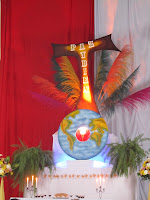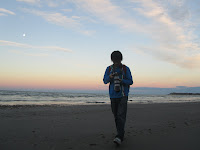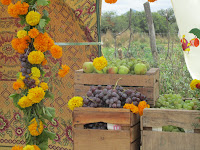 |
| Loma de Arena |
カーニバルが終わってもまだまだ続くイベント。
4月15日タリハの日。そして最大の宗教行事、Semana Santa。
タリハの日は建国記念日のように、子供達は学校ごと、大人は職場ごとに行進をする。場合によると建国記念日よりもずっと派手だと聞かされてた。カーニバルと同じくChapaco・Chapacaの格好をするのだとか。SEDUCAも衣装を揃えたりするのだろうか?と楽しみにしていたけれど、この日は年2回行われるボランティアの総会と重なっていて、タリハにいられない。残念!と嘆いていたら、一週間くらい前からなんだか雲ゆきがあやしくなってきた。国民保険を巡る政府の政策に反対して国中の労働組合がParo(デモ)を始めた。教員組合も当然参加して、学校も休みに。ちょうど子供達相手に授業を始めた頃だから、ちょっと痛い。行進はもう行われないのではないか、とSEDUCAの人々はいう。総会参加の為サンタクルスへ発つ日は、エボ・モラレス大統領がタリハの日に合わせてやってくる日。この騒ぎの張本人が何しにくるとタリハの人々は手厳しい。空港がParoで閉鎖されるらしいとの噂にドキドキしたけれど、幸い早めの時間にこっそりと訪れたらしく、飛行機は無事飛んでくれた。
 今年のボランティア総会は例年と違い、せっかくボリビア中のボランティアが一堂に会するのだから、何かボリビアの人々に向けてメッセージを発しようという主旨のもと、中央広場横のCasa de Culturaを借りて行った。ボランティアの各地での活動に関係するブースや日本文化を紹介・体験するコーナー、東北の地震で被災した人々へのメッセージコーナーを作り、また日本の歌や曲の演奏も行った。
今年のボランティア総会は例年と違い、せっかくボリビア中のボランティアが一堂に会するのだから、何かボリビアの人々に向けてメッセージを発しようという主旨のもと、中央広場横のCasa de Culturaを借りて行った。ボランティアの各地での活動に関係するブースや日本文化を紹介・体験するコーナー、東北の地震で被災した人々へのメッセージコーナーを作り、また日本の歌や曲の演奏も行った。 半日だけではあったけれど、多くのボリビア人が訪れ、次はいつやるのかと聞いてくる人もいるくらいの大成功となった。訪れた人々が楽しむ様子を見るのと同じくらい気持ちいいのは、日本人の、ボランティア同士の、互いに協力しあって物事を進めるその過程。やはり手際がいい。新しい企画を立ち上げた今回の総会委員メンバーの指揮のおかげでもある。ボリビア人と手探りで物事を進めて、少しずつ協力体制を作っていくのにも喜びがあるけれど、このスカッと感は日本人同士だからかと思う。
半日だけではあったけれど、多くのボリビア人が訪れ、次はいつやるのかと聞いてくる人もいるくらいの大成功となった。訪れた人々が楽しむ様子を見るのと同じくらい気持ちいいのは、日本人の、ボランティア同士の、互いに協力しあって物事を進めるその過程。やはり手際がいい。新しい企画を立ち上げた今回の総会委員メンバーの指揮のおかげでもある。ボリビア人と手探りで物事を進めて、少しずつ協力体制を作っていくのにも喜びがあるけれど、このスカッと感は日本人同士だからかと思う。 Pascua。復活祭。イースター。
 |
| 兎の餅つき |
キリスト教の最も大切な祝祭日の1つ。春分の日後の最初の満月の次の日曜日と定められているため、年によって日付が変わる。カナダやアメリカでは復活祭の前日にウサギが卵を運んでくる?ことにちなんで、チョコレートでできたイースターエッグやイースターバニーが町にあふれる。ゆで卵に色を塗って、その卵をスプーンに乗せて走る競争や庭に隠された卵を探す遊びは子供時代の楽しい思い出の1つだ。同じキリスト教でもカトリックとプロテスタント、また地域によって祝い方は違うよう。ボリビア・タリハでは?
 |
| 祭壇にはワインとパン |
イエスの生まれたクリスマスが子供達のものだとすれば、生き返った復活祭は大人のためという。復活祭までの6週間をCuaresma(四旬節)といい、毎週金曜日タリハの人々は肉を断つ。これはイエスが洗礼を受けた後荒野で40日間断食したことに由来し、今でも信心深い人々は断食する。四旬節に入る前にカーニバルがあるのは断食に備えてご馳走を食べる習慣からきている。
Semana Santa(聖週間)は復活祭までの最後の1週間のことで、教会で様々な儀式が行われる一番大事な週になる。メキシコではこの週を含む2週間は仕事も学校も休みとなり、国民大移動の時期になる。なるべく家にいるようにしていたのに、今年は家族でアカプルコに行くことになったと、1ヶ月ぶりに話した友人は少し憂鬱そうに言っていた。カナダでもイースターの2週間は春休みだ。南半球のボリビアは秋。学期のど真ん中ということもあって、長期休暇とはならないが、イエスが十字架にかけられた金曜日は休日になる。そして前日木曜日、イエスが12人の弟子と共に最後の晩餐を行った日はHorario continuo(連続勤務)、昼休みなしで4時で仕事を終えた。町の店も早くに閉まり、人々は皆ミサへ出かける。町中の教会を全てまわる人もいるそうだ。オルガと共に近所の教会3つを訪れた。
聖金曜日。1日部屋の掃除と教材作り。でも昼にはオルガにArvejadaの作り方を教わった。Arveja(エンドウ豆)の料理で、肉を断たねばならない毎週金曜日に人々が食する代表的な料理だ。ゆでたエンドウ豆に炒めたネギをサフランで味付けしたもの、卵、フライドポテト、チーズを加えてまぜ、お米を添えてだす。エンドウ豆はあまり好きではなかったはずなのに、なぜか大好きになってしまった料理。日本に帰っても簡単に作れそうだ。
 夕方オルガの実家のあるValleへ。毎年この日にValleではCalvario又はPasion de Jesus(十字架の道)の行列が行われる。イエスの死刑宣告から埋葬までの14場面をたどるもので、Valleの村の決められた場所に14の祭壇が設けられ、教会から神父初め人々が行列を作り、父ヨゼフ、母マリアそしてイエスの棺をかついでこれらをまわる。この14場面は教会の聖堂でも必ずみられるものだ。祭壇は十字架やイエスの磔図の絵を中心に黄色いPascuaの花できれいに飾りつけられる。Pascuaの花を用いるのはタリハだけの習慣だそうだ。7つめの祭壇はオルガの実家の前と決まっている。着いてから飾りつけで大わらわ。前日にオルガを手伝って作ったペットボドルに黄色いセロハンを張ったろうそく入れもつるした。
夕方オルガの実家のあるValleへ。毎年この日にValleではCalvario又はPasion de Jesus(十字架の道)の行列が行われる。イエスの死刑宣告から埋葬までの14場面をたどるもので、Valleの村の決められた場所に14の祭壇が設けられ、教会から神父初め人々が行列を作り、父ヨゼフ、母マリアそしてイエスの棺をかついでこれらをまわる。この14場面は教会の聖堂でも必ずみられるものだ。祭壇は十字架やイエスの磔図の絵を中心に黄色いPascuaの花できれいに飾りつけられる。Pascuaの花を用いるのはタリハだけの習慣だそうだ。7つめの祭壇はオルガの実家の前と決まっている。着いてから飾りつけで大わらわ。前日にオルガを手伝って作ったペットボドルに黄色いセロハンを張ったろうそく入れもつるした。 夜7時。教会から人々がでてきた。彼らが手に持つろうそくの覆いもペットボトルを切って作ったもの。ここにもリサイクルの精神が生きている。祭壇ごとに行列は止まり、聖歌が歌われ神父が短い説教を行って皆が祈る。静かな行事。ろうそくのやわらかい火がゆれてきれいだ。行列がオルガの家に近づく。オルガの兄弟や甥がイエスの棺を受け取って祭壇にすえた。7つめの祭壇はイエスの2度目の転倒をあらわす。神父の祈りと聖歌の唱和の後、ヨセフ、マリアの像、そして棺が持ち上げられ8つめの祭壇に向かった。見上げると空は満点の星。天の川が白く鈍く光って広がって、オリオン座は日本では見られない角度に傾いている。星の数が多すぎて、星座にあまり詳しくない私にはそれくらいしか見分けられない。
 Valleはワインで最も有名な場所で、タリハを訪れる観光客は必ずといっていいほどこの村を訪れる。けれども村をでてタリハ市内に住む人が多く、普段は使わずに閉められている家も多い。歩きながら、この家も、あの家も誰も住んでいないとオルガの姉エルヴィラが教えてくれる。オルガの実家もそうだ。オルガの母親は実家の向かいにある、オルガの6人の兄弟姉妹の内唯一Valleにのこって暮らすエスぺランサの家で暮らしている。実家はオルガ達がたまに世話に訪れる時以外は閉じられているのだ。夕方になるまで祭壇をつくる気配のないから心配したと近所の人がオルガに言ったそうだ。エルヴィラの娘カリナは子供のころは家族が集まると40人くらいになったのよ、それが今では・・・という。私にしてみればそれでも大きい家族なのだけれど。ボリビアでもある程度の教育を受けた若い世代では子供の数も1・2人という家族が増えてきている。
Valleはワインで最も有名な場所で、タリハを訪れる観光客は必ずといっていいほどこの村を訪れる。けれども村をでてタリハ市内に住む人が多く、普段は使わずに閉められている家も多い。歩きながら、この家も、あの家も誰も住んでいないとオルガの姉エルヴィラが教えてくれる。オルガの実家もそうだ。オルガの母親は実家の向かいにある、オルガの6人の兄弟姉妹の内唯一Valleにのこって暮らすエスぺランサの家で暮らしている。実家はオルガ達がたまに世話に訪れる時以外は閉じられているのだ。夕方になるまで祭壇をつくる気配のないから心配したと近所の人がオルガに言ったそうだ。エルヴィラの娘カリナは子供のころは家族が集まると40人くらいになったのよ、それが今では・・・という。私にしてみればそれでも大きい家族なのだけれど。ボリビアでもある程度の教育を受けた若い世代では子供の数も1・2人という家族が増えてきている。懐かしむように親戚中が集まった時の話をするカリナ。
この日、多くの人たちがValleに里帰りをして、村は人々のおしゃべりでにぎやかだった。
 翌日土曜日はヨガに行こうと張り切って早起きしたのに、Calvarioに参加した先生が寝坊してキャンセル。もう一度ベットに転がり込んでから、近くの友人宅へPastel(チーズのはいった薄いクレープをあげたもの)をもって朝ご飯に出かけた。11時家に戻る。2回目の日本語教室の日。高校生や大学生、友達合わせて7人が集まった。先週ひらがなと漢字を少々したから、今週はカタカナ、そして簡単な挨拶を練習。12時過ぎ、エルヴィラたち一家がお昼ご飯にやってくる。Picante de pollo。これもおいしい料理。これも習いたい料理。夕方4時、メルカドでたまたま知り合った、妹が日本に住んでいるという新しい友人宅にお茶によばれた。プールにジャグジー、ブルーレイつきの巨大なテレビ、すばらしく大きなリビングとキッチンのある大邸宅だった。タリハのお金持ちを見た。そして夜、近くの公園で行われた催しでバイオリンを弾いた。Zapateo de Pascua。早いリズム。たくさん間違えたけれど、踊り手に合わせて弾いたのは初めて。たのしかった。
翌日土曜日はヨガに行こうと張り切って早起きしたのに、Calvarioに参加した先生が寝坊してキャンセル。もう一度ベットに転がり込んでから、近くの友人宅へPastel(チーズのはいった薄いクレープをあげたもの)をもって朝ご飯に出かけた。11時家に戻る。2回目の日本語教室の日。高校生や大学生、友達合わせて7人が集まった。先週ひらがなと漢字を少々したから、今週はカタカナ、そして簡単な挨拶を練習。12時過ぎ、エルヴィラたち一家がお昼ご飯にやってくる。Picante de pollo。これもおいしい料理。これも習いたい料理。夕方4時、メルカドでたまたま知り合った、妹が日本に住んでいるという新しい友人宅にお茶によばれた。プールにジャグジー、ブルーレイつきの巨大なテレビ、すばらしく大きなリビングとキッチンのある大邸宅だった。タリハのお金持ちを見た。そして夜、近くの公園で行われた催しでバイオリンを弾いた。Zapateo de Pascua。早いリズム。たくさん間違えたけれど、踊り手に合わせて弾いたのは初めて。たのしかった。
そして日曜日。イエスの復活した日。オルガは教会へ行ったけれど、私は朝寝坊。ゆっくり起きだしてから、昼前エルヴィラ宅でFricaseの作り方を教わった。大量の豚肉とミキサーにかけた野菜の濃厚なスープにモテ(大きなトウモロコシ)とChuño(干しじゃがいも)をそえて出す。これがsopa(スープ)。Segundo(メインディッシュ)にはKababu(香辛料たっぷりのハンバーグ)を用意。料理をもってオルガの弟オマール宅へ。今日はオマールと奥さんの結婚記念日でもある。エルヴィラの夫、ヴォルフカンはドイツ人。マリア・リリアのために、ボリビアにはないあの懐かしいイースターエッグを探す遊びを用意していた。食事の後、いつのまにか隠されていたチョコレートの兎や卵をみんなで探した。マリア・リリアの歓声が響く。これで、Semana Santaが終わった。オルガの家族とともに過ごした3日だった。
 翌日土曜日はヨガに行こうと張り切って早起きしたのに、Calvarioに参加した先生が寝坊してキャンセル。もう一度ベットに転がり込んでから、近くの友人宅へPastel(チーズのはいった薄いクレープをあげたもの)をもって朝ご飯に出かけた。11時家に戻る。2回目の日本語教室の日。高校生や大学生、友達合わせて7人が集まった。先週ひらがなと漢字を少々したから、今週はカタカナ、そして簡単な挨拶を練習。12時過ぎ、エルヴィラたち一家がお昼ご飯にやってくる。Picante de pollo。これもおいしい料理。これも習いたい料理。夕方4時、メルカドでたまたま知り合った、妹が日本に住んでいるという新しい友人宅にお茶によばれた。プールにジャグジー、ブルーレイつきの巨大なテレビ、すばらしく大きなリビングとキッチンのある大邸宅だった。タリハのお金持ちを見た。そして夜、近くの公園で行われた催しでバイオリンを弾いた。Zapateo de Pascua。早いリズム。たくさん間違えたけれど、踊り手に合わせて弾いたのは初めて。たのしかった。
翌日土曜日はヨガに行こうと張り切って早起きしたのに、Calvarioに参加した先生が寝坊してキャンセル。もう一度ベットに転がり込んでから、近くの友人宅へPastel(チーズのはいった薄いクレープをあげたもの)をもって朝ご飯に出かけた。11時家に戻る。2回目の日本語教室の日。高校生や大学生、友達合わせて7人が集まった。先週ひらがなと漢字を少々したから、今週はカタカナ、そして簡単な挨拶を練習。12時過ぎ、エルヴィラたち一家がお昼ご飯にやってくる。Picante de pollo。これもおいしい料理。これも習いたい料理。夕方4時、メルカドでたまたま知り合った、妹が日本に住んでいるという新しい友人宅にお茶によばれた。プールにジャグジー、ブルーレイつきの巨大なテレビ、すばらしく大きなリビングとキッチンのある大邸宅だった。タリハのお金持ちを見た。そして夜、近くの公園で行われた催しでバイオリンを弾いた。Zapateo de Pascua。早いリズム。たくさん間違えたけれど、踊り手に合わせて弾いたのは初めて。たのしかった。








